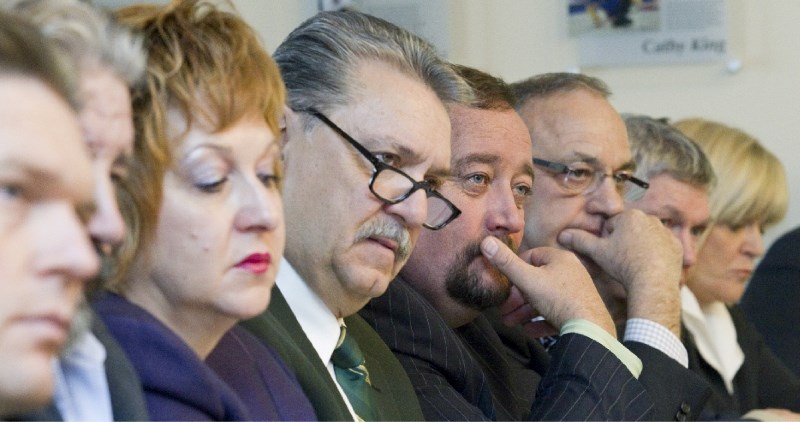The rights of landowners potentially affected by high-power transmission lines dominated a Q & A session with eight cabinet ministers who stopped by St. Albert last Wednesday.
Ministers Iris Evans, Lloyd Snelgrove, Ron Liepert, Mel Knight, Gene Zwozdesky, Ray Danyluk, Heather Klimchuk, Hector Goudreau and Thomas Lukaszuk all attended the St. Albert leg of the provincial cabinet tour and participated in the one-hour bear pit session at the St. Albert Curling Club.
Despite the large cabinet contingent, it was the pair of Sustainable Resource Development Minister Mel Knight and Energy Minister Ron Liepert who answered the majority of questions, many of them lobbed by a handful of concerned Sturgeon County landowners.
Concerns centred on landowner rights, specifically the Alberta Land Stewardship Act, also known as Bill 36, the planning document for land use in the province. Also raised was Bill 19, which allows government to designate and regulate future development on private land, and Bill 50, which streamlines approval processes for large transmission lines.
Landowner Trish Elliott said many Sturgeon County residents are angry with the government for voting on Bill 36, which she says extinguishes existing rights, the right to compensation and the right to appeal before the court.
"We are also upset with Bill 50, which removed a public needs assessment before putting through high-voltage transmission lines," Elliott said.
"All we get is a pat on the back and a brush-off and pretty soon we're going to be tired of trying to talk to you and we're going to start talking to somebody else," she said.
"I'm asking you to please listen to our concerns. They are genuine. They are valid and please start taking them seriously."
Knight said Bill 36 had received a "tremendous amount" of input and consultation from across the province before it was passed in the legislature.
He said he agreed that parts of the legislation were difficult to understand and leaves it open to the conclusion the government was attempting to remove property rights without access to appeal or compensation.
"I'm going to stand here today and tell you categorically that is not correct, that parts of that legislation that give people that opinion, we will amend."
Knight said he will introduce 11 amendments to Bill 36 during the spring session of the legislature, which begins next week.
"I think that it will address all of the concerns that I have heard from around Alberta," said Knight.
Transmission line worries
Liepert was also pressed on Bill 50, which removes a requirement to have the Alberta Utilities Commission (AUC) conduct a needs assessment on certain transmission projects. Some landowners felt the government hasn't taken into consideration compensation for landowners.
Liepert pointed out a needs assessment was never done when the province built Highway 2, to support a growing population.
"The powerlines are no different and what we determined was, the need is there, the process that's going to unfold under the Alberta Utilities Commission is no different than it was in the past and for you to say that somehow landowners are not being appropriately compensated is completely false," said Liepert.
He said the majority of complaints from Albertans are not from affected landowners but from "the person across the road because they actually want the powerline on their land."
"The compensation is as good as anywhere else in the province," Liepert said.
"You can make a political issue out of this if you like."
Liepert pointed out the new powerlines being built until Bill 50 will increase residential bills by $3.30 and that current power rates are the lowest they've been since 2002.
"If we want to have industry in this province located across the province, we had better address our transmission because we are not going to have lights to flick on when we walk through that door in 2020 if we don't address the transmission."
Before the end of the one-hour session, Knight repeated his promise to clarify those parts of the legislation that deal with compensation for landowners.
"I will make it absolutely crystal clear where the compensation resides and there actually is opportunity for compensation under [Bill 36] and under the effect of a plan if it does not reside in some other legislation."
Education funding
Representatives from both the Protestant and Catholic school boards also attended. Trustees used the opportunity to question ministers on infrastructure funding for new schools and asked if the province would consider implementing a predictable and sustainable funding formula for education, as they have for health care.
In response, Snelgrove said it was easier for the province to predict education funding, than it was to predict health funding.
"I wouldn't say that we need that same agreement with education simply because I don't think we've shown anything but a real commitment to fund education," he said.
"I don't think any government in Alberta would change that."




